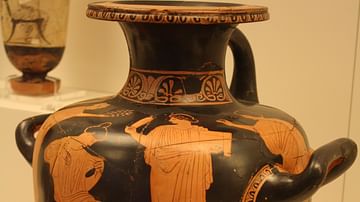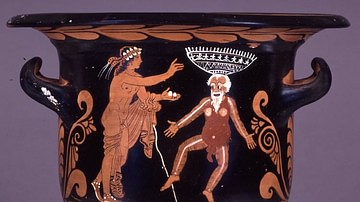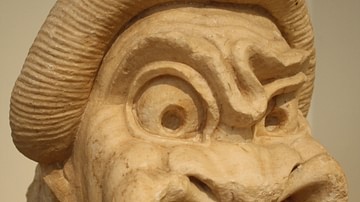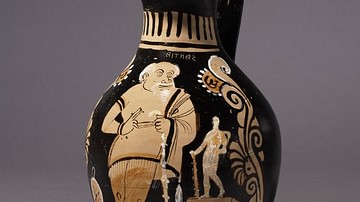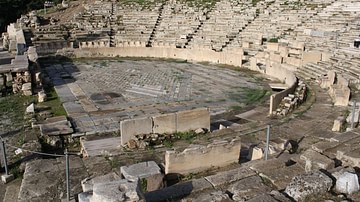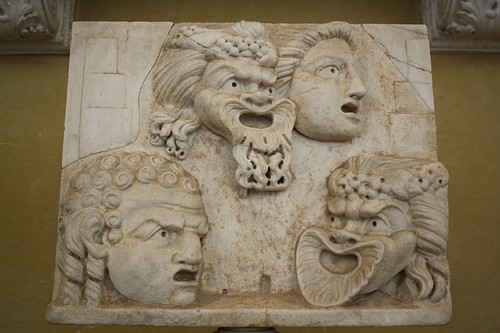
Aristophanes (c. 460 - c. 380 BCE) was the most famous writer of Old Comedy plays in ancient Greece and his surviving works are the only examples of that style. His innovative and sometimes rough comedy could also hide more sophisticated digs at the political elite and deal with social issues such as cultural change and the role of women in society. Indeed, the plays of Aristophanes are not only a record of Greek theatre but also provide an invaluable insight into many of the political and social aspects of ancient Greece, from the practicalities of jury service to details of religious rituals in major festivals.
Life & Character
Little is known about Aristophanes beyond what can be gleaned from his plays and a fictional portrait in Plato's Symposium. From the dates of his works, we may surmise that he was born between 460 and 450 BCE and died sometime between 386 and 380 BCE. He was from Athens, and he may have spent a period of his youth on Aegina following his father Philippus' move there. No contemporary physical portrait survives, but we may surmise from comments in some of his works that he was bald.
Plato presents a fictional gathering of historical characters in his Symposium, but Aristophanes was still well known at the time of its creation (380s BCE) and, therefore, we may assume that the portrayal of the comic dramatist reflected this fact and was recognisably accurate. The poet is presented as a rather amiable chap, sociable, and someone who 'divides his time between Aphrodite and Dionysos', i.e. likes women, boys, and wine. That Plato was favourably disposed to Aristophanes is evidenced in the positive tones of the epitaph he later wrote for the great poet. Plato did, however, in his Apology, blame the poet for fuelling a public distrust of Socrates.
Aristophanes' Plays
More concrete are the comic plays of Aristophanes. Although we know that he wrote more, eleven comic plays survive, and they are the only examples of the so-called Old Comic style which gave way, in the 4th century BCE, to a newer, more sophisticated form of Greek comedy which focussed on intrigue and recurring characters. In contrast, the Old Comedies were by that time looked on as being rather vulgar and lacking in sophistication, Aristotle was one of their staunchest critics. However, it is these older comedies which have perhaps better stood the test of time and appear to the modern reader to be much more contemporary.
Aristophanes' surviving full plays are:
- The Acharnians (425 BCE) about the formation of a peace treaty.
- The Knights (424 BCE) an attack on Cleon.
- The Clouds (423 BCE) criticising Socrates for corruption and sophistry.
- The Wasps (422 BCE) poking fun at the Athenian jury system and the Athenians' preoccupation with litigation.
- Peace (421 BCE) on the peace with Sparta.
- The Birds (414 BCE) where birds construct a new city in the sky and better the gods.
- Lysistrata (411 BCE) where women across Greece go on a sex strike to compel their men to make peace.
- The Poet & The Women or Thesmophoriazusae (411 BCE) where women debate the elimination of Euripides.
- The Frogs (405 BCE) where Dionysos visits Hades and judges a poetry competition between Aeschylus and Euripides.
- The Ecclesiazusae (c. 392 BCE) where women take over Athens and make all property communal.
- Plutus or Wealth (388 BCE) where the god of wealth regains his sight and no longer distributes riches at random.
We know of other titles which have not survived, for example, his first play The Banqueters (427 BCE), and we know that there were two final plays after Plutus which were a little more in line with the new style of comedy. Several of his plays were produced by Callistratus, others by Philonides or Aristophanes himself, and many won prizes at prestigious festivals such as the City Dionysia of Athens.
Aristophanes was most probably instrumental in the evolution of the Greek comic theatre, for example, in the role of the chorus and the reduction in topical references. Using parody, puns, and bold and colourful language, he was able to convey the full spectrum of emotions and, through satire and ridiculous exaggeration, he poked fun at the more ridiculous facets of Athenian society and city-life. Few public figures escaped his sharp wit, and politicians such as Kleon and fellow artists like Euripides were a favourite target as were, on occasion, the populace as a whole. The following selection of extracts illustrates the poet's sly wit:
Sosias:
Well, I'd no sooner fallen asleep than I saw a whole lot of sheep, and they were holding an assembly on the Pnyx: they all had little cloaks on, and they had staves in their hands; and these sheep were all listening to a harangue by a rapacious-looking creature with a figure like a whale and a voice like a scalded sow.
(41; Act One, Scene One, The Wasps)
A dig at democracy and the voters being easily swayed by a good speaker.
Leader:
It's very like the way we treat our money
The noble silver drachma, that of old
We were so proud of, and the recent gold,
Coins that rang true, clean-stamped and worth their weight
Throughout the world, have ceased to circulate.
Instead the purses of Athenian shoppers
Are full of shoddy silver-plated coppers
(183; Act Two, Scene Two, The Frogs)
A comment on the state reducing the silver content of coinage to save money.
Chorus:
Well, you must admit it's true
that it's chiefly among you [men]
That gluttons, thieves, and criminals abound,
Have you heard of banditesses,
Let alone kidnapperesses?
Are there any female pirates to be found?
(128; Act One, Scene Two, The Poet & The Women)
On the virtue of women.
Hail high-priest of subtle bilge...You,
swaggering along the streets as your eye darts shifty glances,
barefoot, putting up with trouble, looking disdainfully, all for us
(Clouds 359-63)
A less than flattering portrait of Socrates.
Not all subjects could be given the comic treatment; for example, higher gods such as Zeus and Athena and certain aspects of Greek religion had to be given due respect and Aristophanes was once charged by the council of Athens for his political views when, in The Babylonians (426 BCE) and during wartime, he represented the Greek city-states as Babylonian slaves on a treadmill. Nevertheless, the comic plays of Aristophanes are indicative of the high degree of freedom of speech tolerated in fifth-century Athens.

